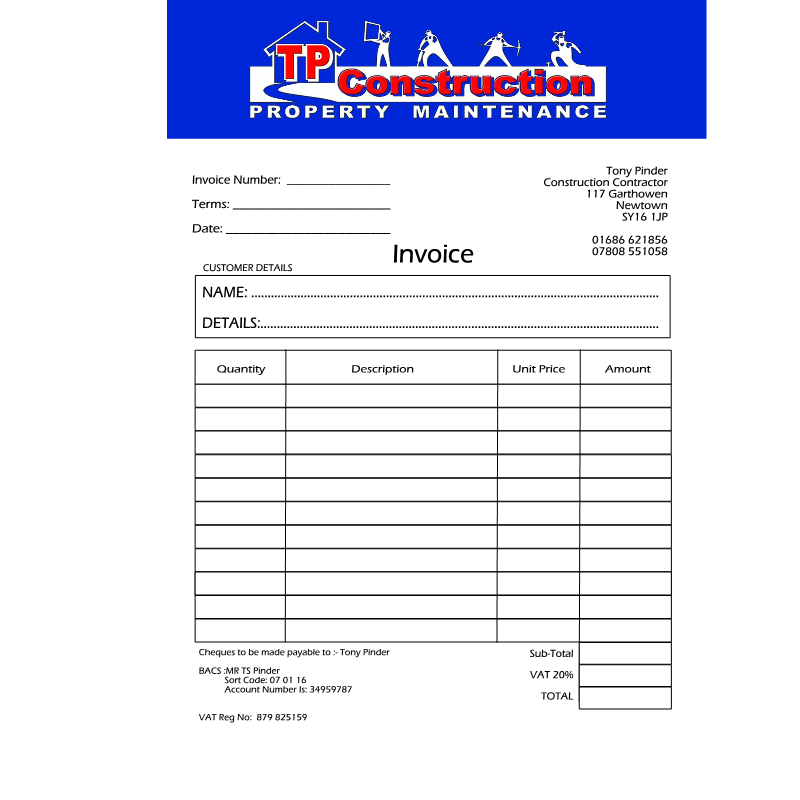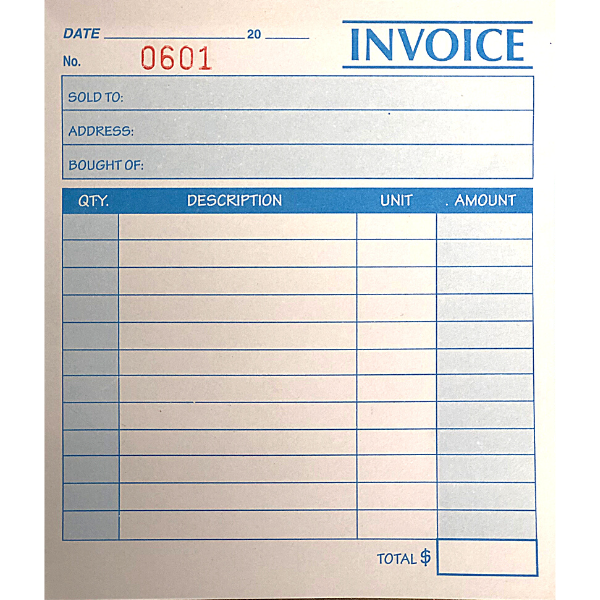Determining invoice book reorder cycles for uninterrupted workflow
Determining invoice book reorder cycles for uninterrupted workflow
Blog Article
Leading Tips for Successfully Taking Care Of Finances With an Invoice Book in Your Company
Effective financial administration is crucial for any business, and an invoice book plays a considerable function in this procedure. It works as a vital tool for tracking income and expenses while making certain timely payments. Selecting the suitable billing book and organizing billings properly are foundational actions. There are added methods to enhance total effectiveness. Understanding these methods can substantially affect a service's economic stability and growth potential. What are one of the most efficient methods to show upon?
Recognizing the Relevance of an Invoice Book
An invoice book acts as an essential tool for services seeking to keep arranged financial documents. It permits business to document purchases methodically, making certain that all sales and solutions provided are precisely tape-recorded. This methodical paperwork is vital for tracking earnings, keeping an eye on capital, and managing expenses.Moreover, an invoice publication help in preserving expertise in organization negotiations. Giving customers with in-depth invoices enhances integrity and depend on, promoting stronger customer partnerships. Furthermore, it simplifies the procedure of filing taxes, as all essential economic info is readily available and organized.
Choosing the Right invoice book for Your Business
Choosing the proper billing book is important for organizations wanting to streamline their financial monitoring. The choice frequently hinges on numerous vital elements, consisting of the nature of business, the quantity of transactions, and particular invoicing demands. Little companies with less transactions might profit from a simple, pre-printed invoice book, while larger business may need tailored options that enable for thorough inventory and branding.Additionally, businesses should consider whether they favor a physical or digital format. Digital invoice publications can provide enhanced features like automatic estimations and easy data storage space, while physical books provide a substantial document. It is also essential to evaluate guide's format for clarity and ease of usage. Eventually, the appropriate billing book will not only facilitate effective invoicing however likewise add to far better capital management and boosted consumer connections.
Organizing Your Invoice for Easy Accessibility
Organizing billings effectively is important for any business, as it assures fast access to important economic documents when required. A methodical method can enhance performance and reduce anxiety during audits or financial analyses. It is a good idea to categorize billings by type, customer, or day, enabling for uncomplicated retrieval. Making use of color-coded folders or classified areas within an invoice book can promote this process, ensuring that documents are quickly identifiable at a glance.Moreover, keeping a digital back-up of physical invoices can supply an additional layer of safety and security and accessibility. Frequently reviewing and purging out-of-date billings will assist keep the system workable, avoiding clutter. Establishing a routine for organizing and keeping billings, whether daily or regular, can significantly simplify monetary operations. By focusing on company, services can conserve time, reduce errors, and support much better financial decision-making, ultimately leading to improved overall management of finances.
Tracking Settlements and Due Dates
Keeping track of repayments and due days is necessary for maintaining economic stability. Organizing repayment timetables can help people manage their capital successfully while lessening late costs. In addition, establishing reminder notifies warranties that no repayment due dates are forgotten.
Organize Payment Timetables
Establishing a clear repayment schedule is crucial for keeping monetary security and guaranteeing prompt money circulation. Services can gain from arranging payment timetables by classifying invoices according to their due dates. This method permits very easy identification of upcoming payments, enabling positive administration of cash sources. By segmenting billings right into weekly or month-to-month timelines, companies can concentrate on critical repayments while additionally evaluating patterns in cash money inflow. Furthermore, a structured timetable help in projecting future financial requirements, which is significant for budgeting objectives. Continually evaluating and updating settlement timetables assures that no due dates are missed out on, fostering strong connections with customers and suppliers. Ultimately, an effective payment timetable improves overall monetary administration and supports a service's development objectives.
Set Pointer Alerts
Exactly how can businesses ensure they never ever miss out on a settlement due date? One reliable strategy includes establishing suggestion alerts. By implementing automated tips, businesses can ensure prompt notices for upcoming settlements and due dates. invoice book. click here This can be accomplished via various techniques, such as calendar applications, invoicing software, or dedicated pointer apps.These signals can be configured to notify users days or also weeks ahead of time, enabling ample time for preparation. Furthermore, organizations must consider categorizing reminders based on top priority, ensuring that important settlements receive unique focus. By continually using suggestion alerts, organizations can enhance their capital monitoring and preserve positive relationships with clients and vendors. Inevitably, this aggressive strategy minimizes the risk of late charges and promotes monetary stability
Carrying Out Regular Billing Practices
Many organizations recognize the significance of prompt payments, implementing regular payment methods frequently proves tough. Developing a standardized invoicing procedure can considerably enhance capital administration. This includes setting specific periods for releasing billings, whether regular, bi-weekly, or monthly, relying on the nature of the company and client relationships.Furthermore, businesses need to guarantee that billings are clear and comprehensive, outlining services made, repayment terms, and due days. Utilizing an organized technique to act on exceptional invoices is similarly essential; reminders can be automated to keep professionalism and trust and consistency.Additionally, educating personnel on the payment process can cultivate responsibility and precision, reducing errors that may postpone settlements. Routinely assessing and readjusting billing methods can help organizations remain aligned with industry requirements and client assumptions, ultimately promoting a healthier monetary atmosphere. Uniformity in these techniques not only enhances effectiveness yet also develops trust with clients.
Utilizing Invoice Templates for Effectiveness
Using billing layouts can significantly improve the effectiveness of the billing development procedure. By simplifying this job, organizations can conserve time and lower mistakes, permitting quicker payment cycles. Additionally, customizing templates for branding purposes guarantees that invoices reflect the business's identity, reinforcing professionalism in customer interactions.
Simplifying Invoice Production Refine
Enhancing the invoice production procedure can considerably improve a service's effectiveness and accuracy. invoice book. By using pre-designed billing themes, companies can reduce time invested in drafting invoices from the ground up. These layouts typically consist of necessary fields, such as client information, detailed services, and settlement terms, making certain that all required information are caught consistently.Furthermore, employing invoice software program can automate computations and lower the probability of human mistake. This not only quickens the procedure however also boosts record-keeping by maintaining an electronic archive of all billings issued. Additionally, standardized layouts can help with quicker testimonials and approvals within the organization, enabling prompt invoicing and boosting capital. In general, a reliable invoice development process is important for keeping financial wellness in an open market
Personalizing Design Templates for Branding
Personalizing billing templates for branding can greatly improve an organization's professional picture while making certain efficiency in the invoicing process. By integrating business logo designs, color pattern, and typography that mirror the brand name identity, services produce a natural look that fosters depend on and acknowledgment amongst clients. Customized design templates can likewise improve data entrance by including pre-filled fields for client details and solutions provided, minimizing errors and conserving time. Furthermore, consisting of personalized messages or terms of service can strengthen customer relationships. Services need to routinely assess and update their invoice develops to straighten with any branding changes, ensuring that their billing process continues to be an expansion of their brand name. This calculated technique not only enhances efficiency yet additionally enhances the brand name's existence in the market.
Consistently Assessing Your Financial Wellness

Often Asked Concerns
Exactly how Usually Should I Update My invoice book?
The regularity of upgrading a billing publication differs by organization demands. Normally, it is recommended to update it regularly, preferably after each purchase, to maintain accurate records and help with reliable economic monitoring.
Can I Use Digital Invoices Rather of a Physical Publication?
The concern of using digital billings as opposed to a physical book indicates a change towards contemporary economic administration - invoice book. Digital billings supply ease and access, enabling businesses to streamline procedures, minimize paper waste, and improve record-keeping efficiency
What Should I Do if a Billing Is Lost?
If an invoice is lost, the person ought to immediately alert the customer, reissue a replicate invoice, and document the scenario for record-keeping. Preserving a clear communication path can protect against prospective misunderstandings or conflicts.

How Do I Take Care Of Late Repayments Successfully?
Taking care of late payments effectively includes sending courteous reminders, developing clear payment terms upfront, and preserving open interaction with customers. Executing an organized follow-up procedure can greatly reduce delays and boost capital for business.
Is It Needed to Maintain Copies of Expired Invoices?
The requirement of maintaining copies of ended invoices varies by sector and lawful needs. Some organizations preserve them for recommendation, audits, or tax obligation purposes, while others may discard them, relying on their operational requirements and policies.
Report this page